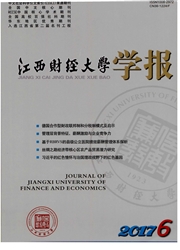

 中文摘要:
中文摘要:
选取2004—2015年中国大陆30个省(市、区)的数据,通过面板门槛回归模型实证测度了农村社会保障对农村居民消费的影响。研究发现,农村社会保障对农村居民消费的影响存在三重门槛效应。当农村人均转移性收入低于388元时,农村居民消费的弹性系数为0.218;当农村人均转移性收入处于388元至741元之间时,消费弹性系数增加为0.232;当农村人均转移性收入处于741元至2080元之间时,消费弹性系数继续增加为0.248;当农村人均转移性收入大于2080元时,消费弹性系数下降为0.236。从地区来看,东、中、西部地区农村社会保障对农村居民的消费同样具有非线性的正向影响,其中,西部地区的消费促进效应最强,东部次之,中部地区最低。基于此,建议进一步提高农村居民转移性收入,增强对西部地区农村社会保障的支持力度,提升农村人力资本,以在更大程度上提振农村居民消费,促进农村地区经济增长。
 英文摘要:
英文摘要:
This paper evaluates empirically the impact of the rural social security system on the rural residents' consumption with the Panel Threshold Regression model based on the data of 30provinces(cities) in the mainland of China from 2004 to 2015. The results show that the rural social security system has triple threshold effect on the consumption of rural residents: when the rural per capita transfer income is below 388 yuan, the elasticity coefficient of rural residents' consumption is0.218; when the rural per capita transfer income is between 388 yuan to 741 yuan, the elasticity coefficient increases to 0.232; when the rural per capita transfer income is between741 yuan to 2080 yuan, the elasticity coefficient increases to 0.248; and when the rural per capita transfer income is beyond 2080 yuan, the elasticity coefficient decreases to 0.236. In terms of regions, the rural social security in the eastern, central and western regions also has a nonlinear positive impact on the consumption of rural residents, of which the consumption promotion effect in the western region is the strongest, followed by the eastern region, and the central region is the lowest. Therefore, it is recommended to further increase the transfer income of the rural residents, strengthen the support of rural social security in the western region, and enhance the rural human capital, so as to boost rural residents' consumption and promote the economic growth in rural areas.
 同期刊论文项目
同期刊论文项目
 同项目期刊论文
同项目期刊论文
 期刊信息
期刊信息
